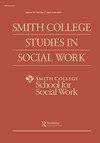Decolonizing Social Work Education and Practice with Students and Community Stakeholders: A Case Example from University of Calgary
IF 0.9
Q2 SOCIAL WORK
引用次数: 0
Abstract
ABSTRACTSocial work education in Canada has struggled to identify and disrupt systems of oppression and marginalization, rooted in a history of colonialism and slavery, that continues to reverberate through neocolonial policies, pedagogy, and practice. Universities and social work programs remain white spaces that uphold white supremacy, while actively excluding nonwhite members and their ways of knowing and being in the world. It wasn’t until the deepened retrenchment of anti-Black racism during the pandemic, punctuated by the killing of George Floyd, that a group of educators seized an opening to teach an anti-racist and anti-colonial praxis course for the Bachelor of Social Work students in spring of 2021, the first one of its kind in our faculty. Students were encouraged to engage with Indigenous and racialized community youth to imagine and integrate anti-racist and reconciliatory actions as part of their assignments. This paper shares our experiences co-designing and co-teaching this course together with community partners. We emphasize lessons from the applied pedagogical approaches as well as its implications for social work education and social work practice.KEYWORDS: Anti-racismanti-colonialismcritical pedagogypraxisracial caucusingacademic-community partnership AcknowledgmentsThe authors would like to thank Cree Métis Elder and Social Worker Kerrie Moore who opened the course in a good way with Indigenous teachings and the importance of Indigenous knowledges in anti-colonial social work; Blackfoot Elder Charlotte Yellowhorn McLeod who led the talking stick teaching to support student learning in Blackfoot ways of knowing and acceptable social work practices. Special thanks also go to the Marlborough Community Youth and their Community Social Worker Lemlem Haile for their contribution to the students’ learning by assisting them to design, develop and implement a community action as part of their course assignments. The authors also thank the community activists and educators who shared their wisdom, experiences and expertise throughout the course. These include Veronica Chirino Baker, Carole Carpot Lacassagne, Mare Donly, Dr. Yahya El-Lahib, and Vanesa Ortiz. Our appreciation to the team of community activists who organized the original community Learning Series. This includes Nellie Alcaraz, Michelle Bella, Tatiana Oshchepkova, Viviana Reinberg, Muna Salah, Ryan Valley, and Blackfoot Elder Adrian Wolfleg.Disclosure statementNo potential conflict of interest was reported by the author(s).Notes1 This excerpt was included with the permission of Elder Moore.2 This excerpt was included with the permission of Elder YellowHorn McLeod.3 This excerpt was included with the permission of Dr. Yahya El-Lahib.4 This excerpt was included with the permission of Carole Carpot, Veronica Chirino Baker, Vanesa Ortiz, and Mare Donly.学生和社区利益相关者的非殖民化社会工作教育与实践:以卡尔加里大学为例
摘要加拿大的社会工作教育一直在努力识别和破坏压迫和边缘化制度,这些制度植根于殖民主义和奴隶制的历史,并继续在新殖民主义政策、教学和实践中产生反响。大学和社会工作项目仍然是维护白人至上的白人空间,同时积极排斥非白人成员及其认识和存在世界的方式。直到疫情期间,反黑人种族主义加剧,乔治·弗洛伊德(George Floyd)被杀,一群教育工作者抓住了一个机会,在2021年春季为社会工作学士学生开设了一门反种族主义和反殖民实践课程,这是我们学院的第一个此类课程。学生们被鼓励与土著和种族化的社区青年接触,想象和整合反种族主义和和解行动,作为他们作业的一部分。本文分享了我们与社区合作伙伴共同设计和共同教学该课程的经验。我们强调应用教学方法的教训,以及它对社会工作教育和社会工作实践的影响。关键词:反种族主义,反殖民主义,批判教学,实践,种族核心,学术-社区合作感谢作者要感谢Cree m·埃尔德(Elder)和社会工作者Kerrie Moore,他们以土著教学和土著知识在反殖民社会工作中的重要性很好地开设了这门课程;黑脚长老Charlotte Yellowhorn McLeod领导了谈话棒教学,以支持学生以黑脚的方式学习和接受社会工作实践。特别感谢马尔伯勒社区青年和他们的社区社会工作者Lemlem Haile,他们帮助学生设计、开发和实施社区行动,作为他们课程作业的一部分,为学生的学习做出了贡献。作者还感谢社区活动家和教育工作者,他们在整个课程中分享了他们的智慧、经验和专业知识。这些人包括Veronica Chirino Baker, Carole Carpot Lacassagne, Mare Donly, Yahya El-Lahib博士和Vanesa Ortiz。我们感谢组织了最初的社区学习系列的社区活动家团队。这包括Nellie Alcaraz, Michelle Bella, Tatiana Oshchepkova, Viviana Reinberg, Muna Salah, Ryan Valley和Blackfoot长老Adrian Wolfleg。披露声明作者未报告潜在的利益冲突。注1本节选经摩尔长老许可。2本节选经麦克劳德长老许可本节选经Yahya el - lahib博士许可这段摘录是经过卡罗尔·卡波特、维罗妮卡·奇里诺·贝克、瓦内萨·奥尔蒂斯和马雷·唐纳的许可而收录的。
本文章由计算机程序翻译,如有差异,请以英文原文为准。
求助全文
约1分钟内获得全文
求助全文
来源期刊

SMITH COLLEGE STUDIES IN SOCIAL WORK
SOCIAL WORK-
CiteScore
1.50
自引率
10.00%
发文量
10
期刊介绍:
Smith College Studies in Social Work focuses on the vital issues facing practitioners today, featuring only those articles that advance theoretical understanding of psychological and social functioning, present clinically relevant research findings, and promote excellence in clinical practice. This refereed journal addresses issues of mental health, therapeutic process, trauma and recovery, psychopathology, racial and cultural diversity, culturally responsive clinical practice, intersubjectivity, the influence of postmodern theory on clinical practice, community based practice, and clinical services for specific populations of psychologically and socially vulnerable clients.
 求助内容:
求助内容: 应助结果提醒方式:
应助结果提醒方式:


